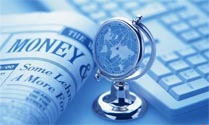Serbian economy prisoner of politics, central banker says
 Belgrade - Serbia's Central Bank governor Radovan Jelasic is one of the country's top policymakers, but his powers were limited, he noted.
Belgrade - Serbia's Central Bank governor Radovan Jelasic is one of the country's top policymakers, but his powers were limited, he noted.
Politicians hold the key to Serbia's economic progress and Jelasic, a reformist Western-educated banker, warned fellow Serbs to keep that in mind when they make their choices in early parliamentary elections on May 11.
The vote, pitting pro-Europeans against ultra-nationalists, will be a referendum on Serbia's direction, influencing foreign investment and loans critical to economic growth. Polls suggest ultra- nationalists hostile to the West could win enough votes to form the next government.
In a recent interview with Deutsche Presse-Agentur dpa at his Belgrade office, Jelasic stopped short of taking sides. But he said Serbs can't expect to vote "for a troubled policy, then ask the world to foot your bills and prop up your growth and exchange rate."
He expressed frustration at the slow pace of market reforms and the time lost to frequent elections since strongman Slobodan Milosevic fell in October 2000.
Jelasic, 40, has often complained that populist Serbian politicians undermine monetary stability by failing to reform and spending too much, in contrast to the central bank's harshly restrictive policies.
"Our economic development has always been prisoner of some political issue. Until that changes, it will continue to hinge on politics," he told dpa.
Instead of pushing the transition at the fastest possible pace once Milosevic was toppled, politicians in power flirted with the electorate - which in turn became increasingly frustrated over failed promises and unfulfilled expectations.
As a result, large state-owned firms remain untouched by privatization and restructuring, and government spending has ballooned to the outer limits of the country's tolerance.
"Everybody in politics and institutions knows what must be done, so we must ask why isn't it done. Then we come to it - not now, we have these elections, wait now, this will happen in Montenegro and that in Kosovo," said Jelasic, a member of the reformist G17 party who has headed the Serbian National Bank since 2004.
In a country as volatile as Serbia, elections worry foreign investors and lenders - last year, the country drew 2.2 billion dollars in foreign investment and borrowed 4.9 billion dollars.
The 7 billion dollars covered Serbia's gaping current account deficit, running at some 17 per cent of gross domestic product.
But if foreign investors and banks decide Serbia is becoming too risky, the country's economic stability would come under more pressure.
Some deals have already fallen through in the shadow of another tense election, such as the sale of state-run copper smelter in Bor and the construction of the Horgos-Pozega highway, both worth hundreds of millions of dollars.
With foreign businesses investing in Serbia to the tune of billions of dollars, a return to Serbia's Milosevic-era isolation of the 1990s is out of the question, Jelasic said.
Yet the recovery is fragile. He points to Serbia's stock market indices, sent into free-fall by the country's political uncertainty and pressure on the dinar currency - until now a stability pillar.
Serb voters must understand that connection, said Jelasic, jabbing Serbia's political elite with a sarcastic reference to Belgrade's main river.
"A politician has the right to argue that indices depend on air temperature or the level of the Danube, but in reality, the bourse and the currency have their preferred partners," he said. "If the preferred partners win, the indices are good."
Meanwhile, Serbia has lost "half of the time" since 2000 to election campaigning, he said.
Since Milosevic's fall, there have been nearly two dozen elections - for parliament, president, local authorities and the now defunct union with Montenegro, as well as a major referendum.
"The election cycle here is much too short," Jelasic said. "We should have reformed much more aggressively all that time." (dpa)